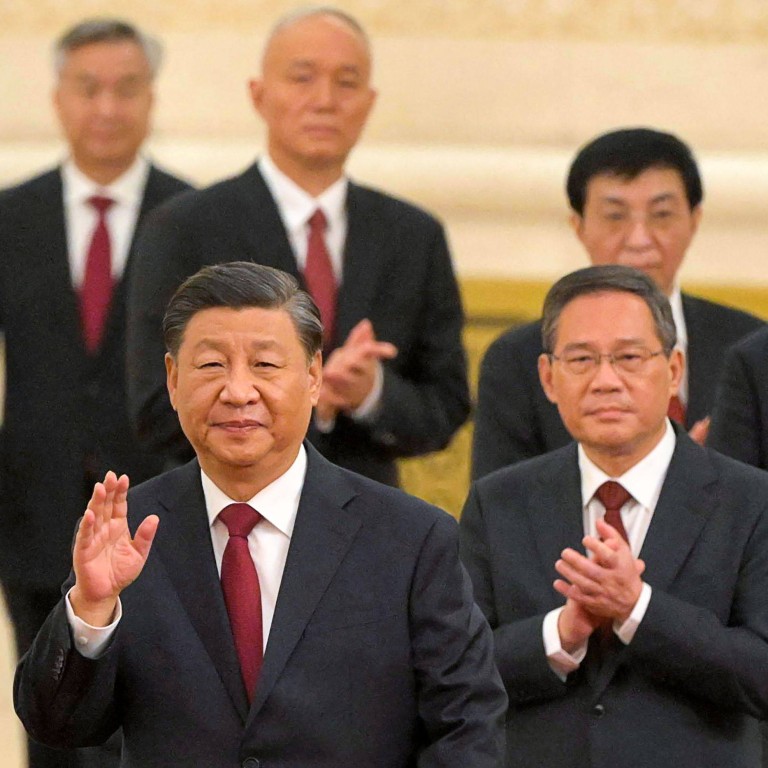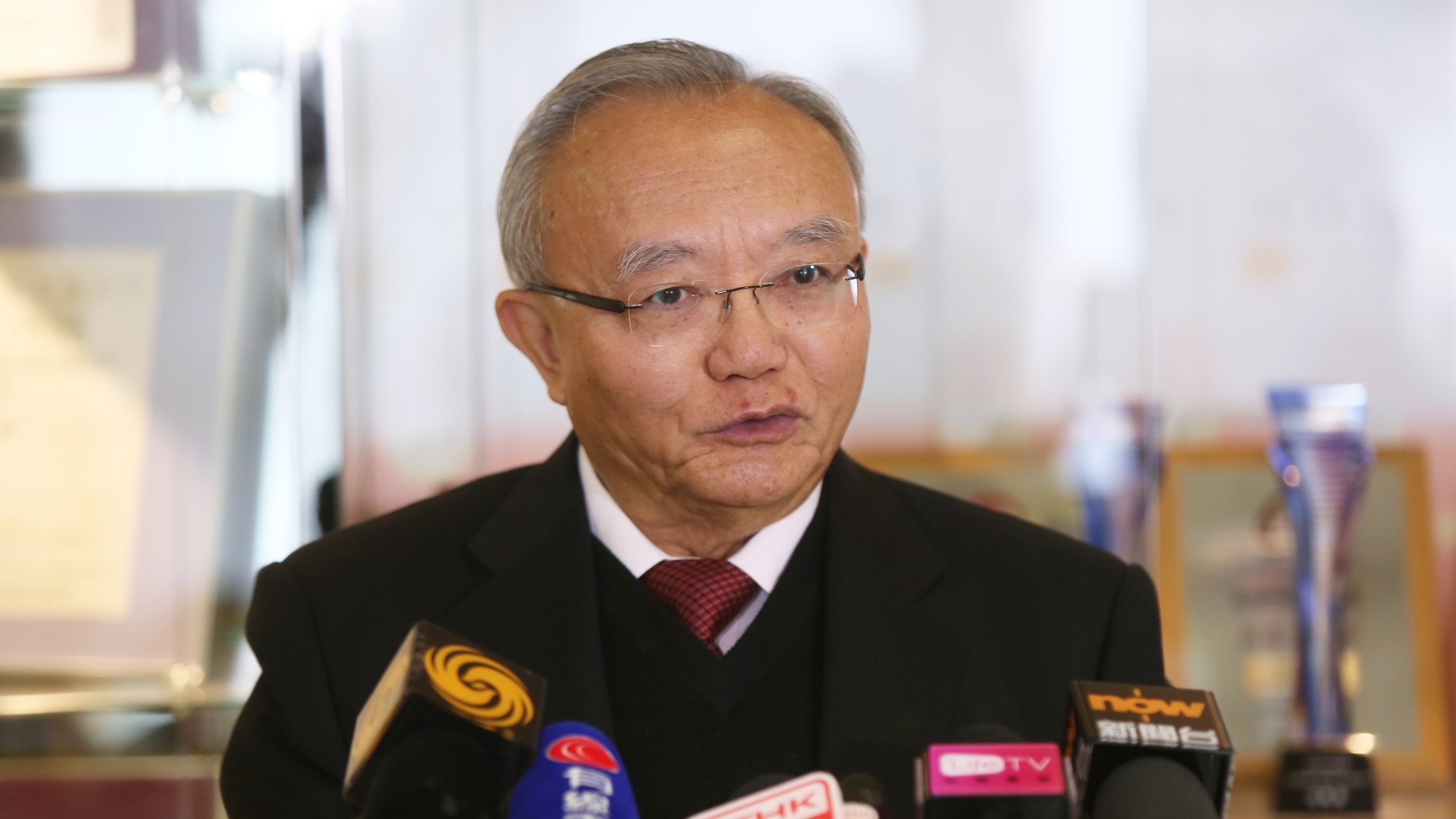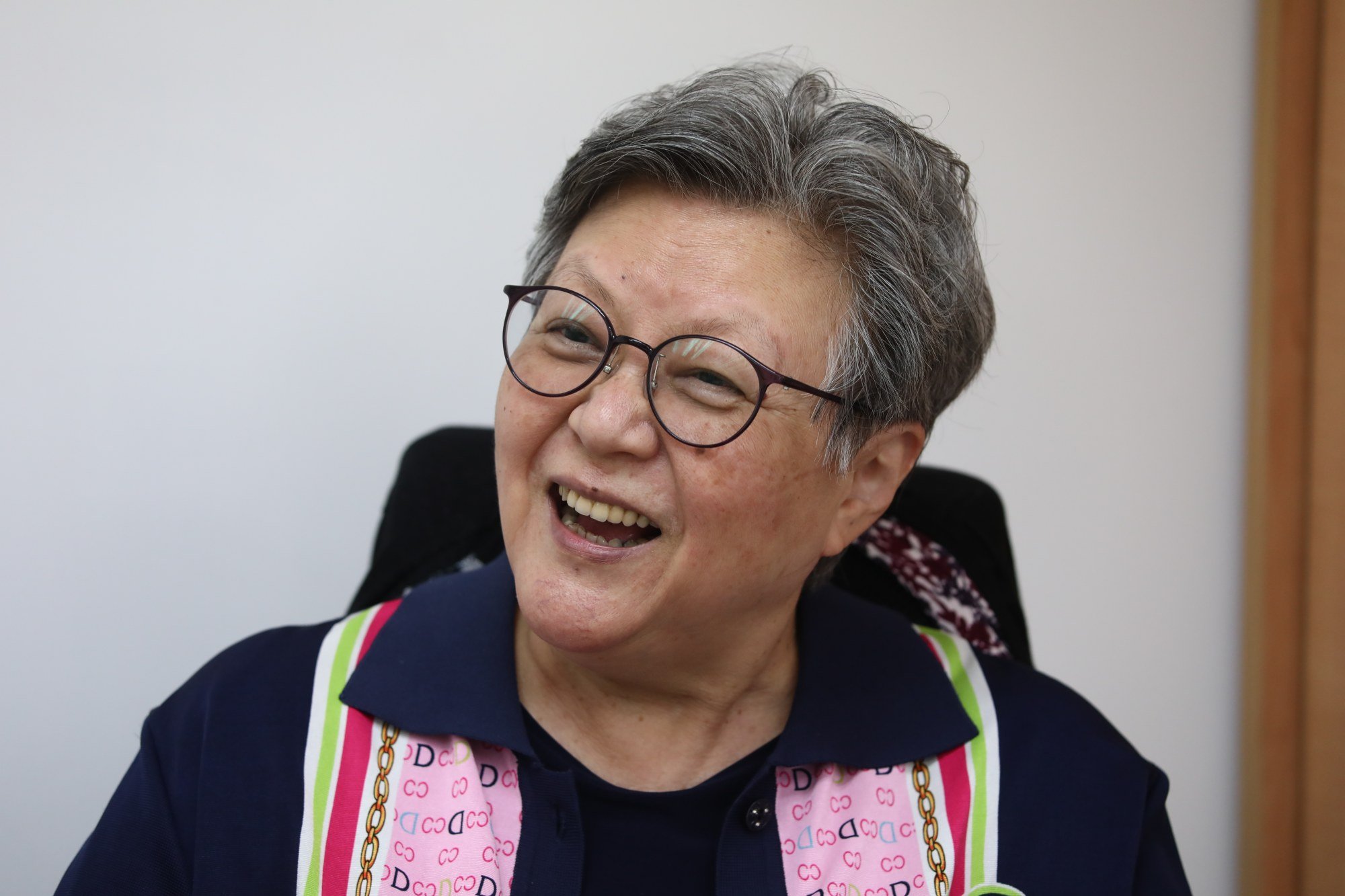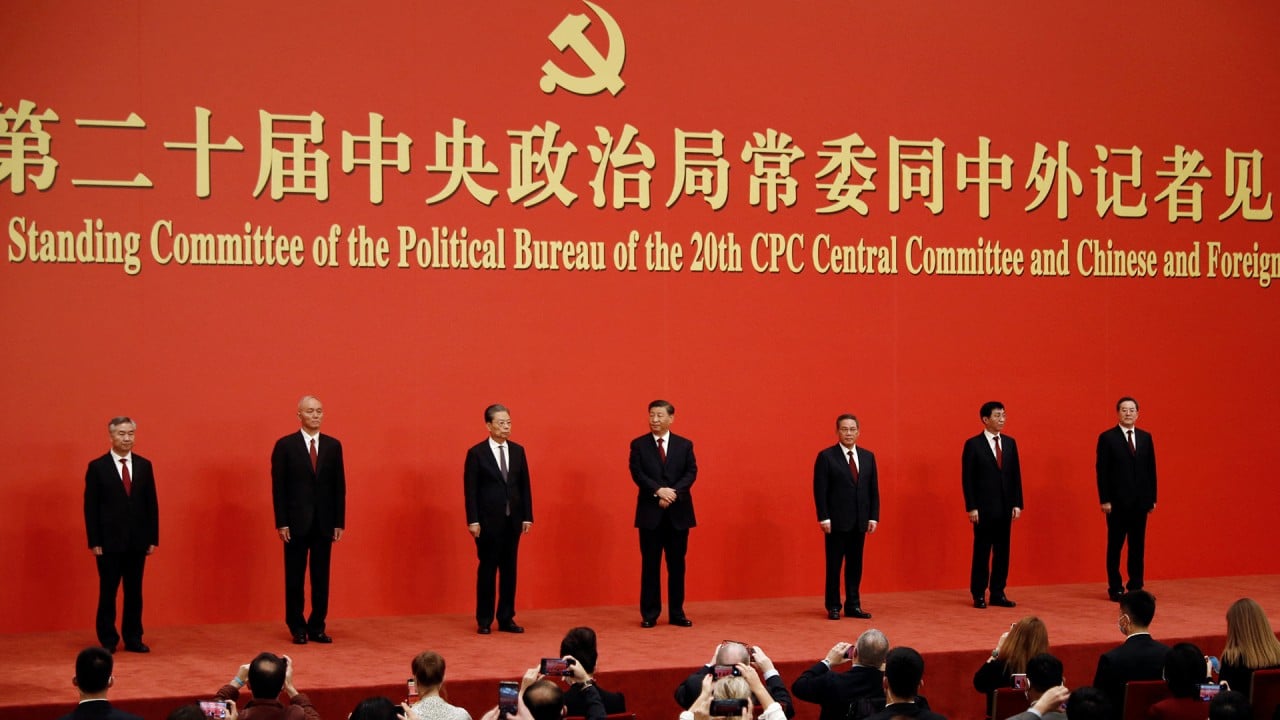
The Hong Kong connection: Xi Jinping, 4 other top Chinese leaders and an ideologue who studied city from afar
- New hierarchy of seven-member Politburo Standing Committee could lead to smoother implementation of key policies involving Hong Kong, analysts say
- Pro-Beijing heavyweight says new team gives Hong Kong ‘quite a lot opportunities to be involved in the overall development of China’
Pro-Beijing heavyweight Rita Fan Hsu Lai-tai also said the new team would be “an asset” for Hong Kong as it could guide the city through an increasingly tense geopolitical environment and help it to further integrate with the country’s overall development.
“The geopolitical situation will just get more intense as time goes by, as China gains more momentum and the West will increase their pressure in order to disrupt … it will be an asset for us with these new leaders that know about Hong Kong, we need very intelligent and determined leadership to guide us through,” said Fan, the city’s former sole delegate to the National People’s Congress Standing Committee.
Lau Siu-kai, vice-president of the Chinese Association of Hong Kong and Macau Studies, added the leaders’ on-the-ground experience in Hong Kong affairs and links built with the city over the years “would facilitate a smoother delivery of key policies”, as they had a “holistic view of the practical circumstances in Hong Kong”.

The new hierarchy of the seven-member Politburo Standing Committee, the Communist Party’s top ruling body, was revealed on Sunday.
Five of them – Xi Jinping, 69; Li Qiang, 63; Cai Qi, 66; Ding Xuexiang, 60; and Li Xi, 66 – had close ties with the financial hub in their previous roles.
Another member, Wang Huning, 67, dubbed by analysts as “the brains behind the throne” in Chinese politics, was devoted to researching the consequences of mainland policies on Hong Kong in the early days.
He and seventh member Zhao Leji, 65, who headed the party’s top anti-corruption body over the past five years, did not have official links with the city yet both made surprise appearances at discussions with Hong Kong delegates in the country’s annual legislative sessions in 2018.
Arousing quite a lot of interest in Hong Kong was Li Qiang’s resume, which revealed that he did a master of business administration programme at Hong Kong’s Polytechnic University from 2003 to 2005.
The 63-year-old appeared as the obvious choice to be anointed China’s next premier at the annual legislative session in March when he appeared right after President Xi on the stage at the Great Hall of the People as the second-ranking Politburo Standing Committee member.
Long before his elevation, Li led delegations to Hong Kong in 2017 when he was the party chief of Jiangsu province, when he vowed at a high-level summit to pair the advantages of its manufacturing industry with the pluses of Hong Kong’s service industry.
How US analysts are interpreting Xi’s priorities at China’s 20th party congress
After his promotion to Shanghai’s party secretary the same year, Li who had earned a reputation for being friendly to business, also occasionally met Hong Kong’s representatives from the sector in that capacity.
Seen as Xi’s chief of staff, Ding Xuexiang, director of Xi’s personal office, has since 2015 participated in numerous meetings related to the annual report that Hong Kong’s leader gives to the state leader every year.
Familiar with Hong Kong and Macau’s affairs, Ding also accompanied Xi on many of his foreign and domestic trips, including his two visits to Hong Kong in 2017 and this July when he swore in city leaders Carrie Lam Cheng Yuet-ngor and John Lee Ka-chiu respectively.
Also on the trip this July with Xi was another Politburo member, Wang Huning. Wang worked on the drafting of the country’s 13th and 14th five-year plans, with both blueprints containing specific chapters to enhance integration between Hong Kong and the mainland on different fronts.
A diary published by the soft-spoken former academic back in 1994 showed that Hong Kong, then under the British, had been on Wang’s mind from those early days.
He said he was invited to the city by a university in the United States to attend a conference and study the impacts of mainland politics and economy on Hong Kong and Taiwan. He did not have time for the trip but highlighted the necessity of strengthening research on the regional economic interactions and the changes of dynamics of Chinese communities overseas.
He also hailed former paramount leader Deng Xiaoping’s Hong Kong solution of having “one country, two systems” as its governing principle as “innovative”, but pointed out that Deng was the first leader to stress the importance of sovereignty.
Noting how Deng said it must be placed at the highest priority, particularly for developing countries like China, Wang’s early writings showed the need to keep a fine balance between the one country, two systems principle and sovereignty.
Cai Qi led a breakthrough in cooperation between the capital and the financial hub as Beijing’s party secretary. Under his leadership, the mechanism was renamed as the Hong Kong/Beijing Co-operation Conference to facilitate high-level talks in 2018. It was touted by the then chief executive Lam as “a milestone” in the spirit of mutual benefit.
Li Xi also played a key role in pushing for regional cooperation as the party chief for the southern economic powerhouse of the Guangdong province from 2017. During Hong Kong’s fight against its worst Covid-19 pandemic outbreak this March, Li headed to Shenzhen to coordinate the central government’s support to the city and to ensure there were sufficient supplies.
Xi himself first visited the city in 2008 when he was the vice-premier, when he was put as the leading figure in Hong Kong and Macau affairs.
Fan, the pro-Beijing heavyweight, said with the new leadership that was familiar with the city, Hong Kong had “quite a lot opportunities to be involved in the overall development of China”, while on the other hand, she expected the Western world, led by the United States “is not going to allow Hong Kong to enjoy such growth without interruption”.
“Like it or not, the United States will try every means to hamper China’s economic development … I’m glad that we have this group of leaders to steer the way forward for our country, because we need very intelligent and determined leadership,” she added.

Lau, a veteran China watcher, said that following Beijing’s electoral overhaul to ensure only “patriots” administered Hong Kong, the expected major tasks related to local affairs for Xi’s inner circle were to improve governance and prevent the city being used as a pawn in geopolitical struggles.
Meanwhile, at least six new Politburo members – not in the standing committee – boast qualifications in science and technology fields, a sign that Xi was seeking to counter pressure from the West by fostering the country’s strengths in the areas. Their areas of expertise range from rocket science to nuclear power safety and public health.
Xinjiang party secretary Ma Xingrui, 63, and Zhejiang party secretary Yang Jiajun, 58, were both former chief commanders of China’s space programme before they entered politics.
Shandong party secretary Li Ganjie, 57, and Beijing mayor Chen Jining, 57, are environment experts. Liaoning party secretary Zhang Guoqing, 58, was chief executive of China North Industries – China’s biggest defence conglomerate, and Fujian party secretary Yin Li, 60, is a public health expert.
Hong Kong this week: unpacking John Lee’s policy speech and the Communist Party’s congress
At a public event on Monday, Chief Executive John Lee Ka-chiu said the central government had required the city to seize opportunities and put the development of innovation and technology in a more prominent position. The administration would not only grab talent, but pour financial resources into doing so, he said.
Since the city’s handover to Chinese rule in 1997, it has been a norm for a member of the Politburo Standing Committee to take over supervision of Hong Kong affairs. Under the leadership of Vice-Premier Han Zheng, who chaired the highest body for Beijing’s policy on Hong Kong and Macau starting in 2018, the “central coordination group” was elevated to a “leading group” in February 2020, months after anti-government protests.
The stepping down of Han, 68, from the party’s Central Committee paved the way for a reshuffle of the team to oversee the city’s affairs next March when the National People’s Congress holds its annual meeting.
Pressure on Hong Kong to pass own national security law: political heavyweights
Speaking on condition of anonymity, a mainland Chinese official based in Beijing said it was too early to assess who would fill his shoes.
“It is not the highest priority for the Politburo now, as everyone is busy settling down in their new role,” the source said.
The official recalled that five years ago, many jumped to the conclusion that Zhao would take up the top role when he first appeared in meetings with Hong Kong delegates of the Chinese People’s Political Consultative Conference in March 2018. But they were proven wrong when Han was named for the top role.
Fan and Lau agreed that by elimination, Ding stood a high chance of succeeding Han next March. The China watchers said Wang and Zhao would have their plates full if they were expected to head the top legislative and consultative body respectively. While Li was on track to lead Xi’s anti-graft drive, Cai would be occupied by everyday party issues if he headed the Secretariat.
“Ding’s capacity, international outlook and connections with Hong Kong officials made him a potential leader to oversee the city’s affairs,” Lau said.
Additional reporting by William Zheng



